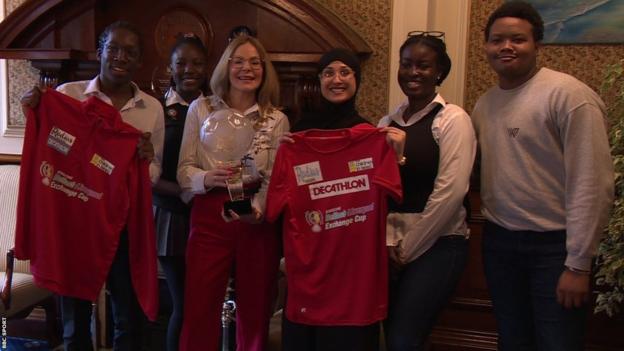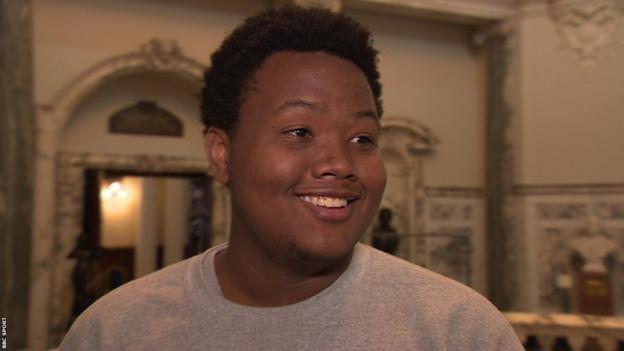
“I think the name of the campaign ‘worth playing’ says it all. We lost a lot of talent.”
Seeing young people denied sporting outlets and potential future ambitions hurts Adekanmi Abayomi.
Ten years after he arrived in Northern Ireland, the Nigerian asylum seeker is still waiting for the final result of his request for refugee status with his wife and three children.
So he knows all about being stuck in this legal limbo and his role as founder of the Ethnic Minorities Sports Organization Northern Ireland (EMSONI), Adekamni was at Belfast City Hall this particular Thursday asking for support from Lord Mayor Tina Black in the campaign. to give hope to young immigrants whose sporting ambitions seem to be blocked by Home Office rules.
The main event on the EMSONI calendar is the Northern Ireland Confederations Cup which sees football teams made up of immigrants and other local clubs battle it out for glory every summer.
The Ghanaian team won the tournament last year and together with Adekamni they traveled to Liverpool earlier this month to play a match against the winners of the same competition as part of EMSONI’s UK-wide campaign to raise awareness of the difficulties of asylum seekers to be allowed to play professional sports. even in an unpaid capacity.
The difference between refugees and asylum seekers
Immigrants granted refugee status in the UK after successfully claiming asylum have the right to work, which includes competing in professional sport.
However, it is so complicated for talented players that asylum applications remain rare.
The Home Office says it encourages asylum seekers to do voluntary work as long as it does not amount to unpaid work – and many do with organizations such as the National Health Service – but Abayomi said the the small print of the rules makes it almost impossible for asylum seekers to follow their professional sporting dreams.
A Home Office spokesperson told BBC Sport Northern Ireland: “We are committed to ensuring that asylum claims are considered without unnecessary delay but some cases can be more complex and take longer to process.
“There is nothing to stop asylum seekers from playing sport for free.”
Adekanmi Abayomi, however, insisted that the situation was not as simple as the Home Office maintained.
“Part 11B of the immigration rules allows asylum seekers to apply for a work permit if they have not received an initial decision on their claim within 12 months but this will only be considered if that delay is not due to the fault of the applicant,” said the EMSONI founder.
“If such an application is successful, the asylum seeker will only be allowed to work in areas under the Shortage Occupation List published by the Home Office and obviously sport is not included in this list. By implication, this keeps them where they are. able to work.
“Volunteering for asylum seekers is technically encouraged for a charity, civic or public sector organization but volunteering for commercial companies, such as elite sport clubs, can be considered work and the necessary papers must be in place,” Abayomi added.
“For an asylum seeker to participate in an elite sport, either as a player or coach, they need a certificate of sponsorship from an elite sport club with a job offer that enables them to apply for leave to remain in the UK.
“Without leave to remain, the relevant sport governing body cannot register such an asylum seeker to play professionally.
“The only route for asylum seekers to participate in professional sport is for the Home Office to introduce a framework that allows asylum seekers to participate in elite sport as volunteers and include sport into Shortage Occupation List because there is a short supply of developed sportspersons in the UK and a lot of talent is lost in the asylum system.”
‘A sportsman’s career is short’
The EMSONI chair added that the intrinsic shortness of most sporting careers means there should be a relaxation of the rules to allow asylum seekers to play professional sport while their claims for refugee status are still pending.
“The road is very long for these young people because they don’t have time to be patient. A sportsperson’s career is short,” Adekanmi continued.
“When you’re deprived of that kind of involvement, it has huge effects on their mental health. because we’re wasting talent.”
‘I’m depressed and in hospital’
One such talent is 15-year-old Algerian Asma Chendali whose love for basketball is matched by her ability but has seen her hopes of a semi-professional sporting career in Ireland thwarted by Home Office policy. .
“I was actually not allowed to play at the professional level that I was told I could because I was an asylum seeker,” said Asma, who along with her family, was finally granted refugee status recently after the eight years of waiting. .
“It broke my heart and I got into trouble at school and I ended up really depressed. I was in the hospital for a few months. It felt like my world had ended.”
While Asma’s refugee status means she is now eligible to play in the Women’s Super League in Ireland or the UK, she fears the “lost years” could mean it is too late.
“Now that I’m really trying to play, my physical health is not the best because I’m not training like everyone else.
“I kind of stopped because ‘what’s the point?’ so now, I literally can’t do what I’ve always wanted to do.”

Given Hindjou, an 18-year-old Namibian who arrived in Northern Ireland 11 months ago, also has a love for basketball in addition to ambitions to forge a career in rugby.
“I’m busy trying to hone my skills and going to the gym regularly but it doesn’t help much because you’re not working on the ball,” Given said.
“I slowly forgot how to play and also how to grow within the game.
“I like to play even though we don’t play for money. We just want to have fun and improve our skills.”
‘We will not limit the campaign to Northern Ireland’
Adekanmi, whose work for the organization he founded led to him being named BBC Sport NI’s Unsung Hero in 2020 for outstanding contribution to grassroots sport, said Given, Asma and many others “must be freed and allowed the opportunity to participate like other young people”.
“We are very grateful for the support we have received for our campaign from BBC Children In Need and we will be working with many strategic people in the community across the UK to ensure we put this message in the right place,” added EMSONI founder.
So last week’s football match in Liverpool.
“This policy affects asylum seekers across the UK so we will not limit that campaign to Northern Ireland,” continued Adekanmi, whose asylum seeker status means he cannot coach despite having just graduated on a Uefa Diploma C course run by the Irish Football Association.
“We have other young people, who because of injury, want to move into teaching but they can’t do that because of Home Office rules.
“We are working with professional clubs including Linfield and Crusaders in Northern Ireland and Everton in England as these rules affect them.
“Clubs want the show but they can’t get the talent of the asylum seekers.
“Professional clubs will also be beneficiaries of this campaign when it is achieved.”
